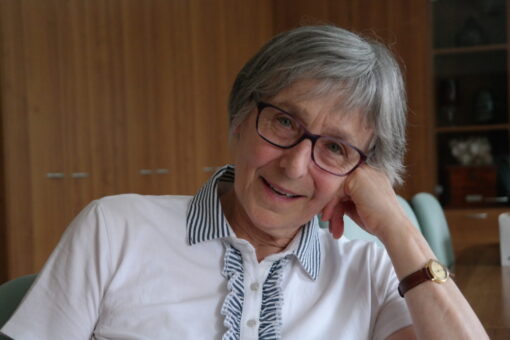A volume of Chiara Lubich’s works entitled “Letters” has been on sale in Italian bookshops for several months. We spoke to Florence Gillet from the Chiara Lubich Centre, a theologian and scholar of the Focolare Movement’s founder who edited the publication.

Florance Gillet
 “There is great variety in these letters”, explains Florence Gillet. “Some are pure spiritual direction; then there are the updating letters; letters of consolation; letters that flow from Chiara Lubich’s soul, especially those written to her sister which are very deep and strong. But they all have something in common. First of all, the literary genre, namely that they are all letters. Secondly, you find something of Chiara’s ‘soul’ in each one of them, the way she knows how to ‘make herself one’, as St Paul says when he declares ‘I have made myself all things to all people’. Even in communicating her secret, since the clear reference to Jesus forsaken is evident everywhere’. What can this volume be compared to? This is the question Florence Gillet asks herself in the introduction and she responds with a very eloquent image: “If it were a garden, it would be an English garden without geometric shapes or symmetries but where nature is poetry and freedom with rigour and order. If it were a road, it would be a path, at times adventurous but one that is well-marked, with a clear destination and an experienced guide. If it were a house, it would be hospitable, with many interconnecting rooms, each in harmony with each other, warm and open”. The book contains 338 letters (a selection of the many letters written by Lubich) that bring the reader into direct contact with the early years of the nascent Focolare Movement and the development of its charism. “I advise everyone to make the effort,” Florence continues, “to start reading from the introduction, to grasp the key to the reading, and then continue with the letters, one by one, in an orderly way, letting them ‘speak to the heart'”. The reader will find letters to individuals, letters to nascent communities, letters to members of her family; They will find other letters that are more doctrinal, in which Chiara explains her Ideal. “Producing this book has been a fascinating project,” she concludes, “and I think readers will find it fascinating too”.
“There is great variety in these letters”, explains Florence Gillet. “Some are pure spiritual direction; then there are the updating letters; letters of consolation; letters that flow from Chiara Lubich’s soul, especially those written to her sister which are very deep and strong. But they all have something in common. First of all, the literary genre, namely that they are all letters. Secondly, you find something of Chiara’s ‘soul’ in each one of them, the way she knows how to ‘make herself one’, as St Paul says when he declares ‘I have made myself all things to all people’. Even in communicating her secret, since the clear reference to Jesus forsaken is evident everywhere’. What can this volume be compared to? This is the question Florence Gillet asks herself in the introduction and she responds with a very eloquent image: “If it were a garden, it would be an English garden without geometric shapes or symmetries but where nature is poetry and freedom with rigour and order. If it were a road, it would be a path, at times adventurous but one that is well-marked, with a clear destination and an experienced guide. If it were a house, it would be hospitable, with many interconnecting rooms, each in harmony with each other, warm and open”. The book contains 338 letters (a selection of the many letters written by Lubich) that bring the reader into direct contact with the early years of the nascent Focolare Movement and the development of its charism. “I advise everyone to make the effort,” Florence continues, “to start reading from the introduction, to grasp the key to the reading, and then continue with the letters, one by one, in an orderly way, letting them ‘speak to the heart'”. The reader will find letters to individuals, letters to nascent communities, letters to members of her family; They will find other letters that are more doctrinal, in which Chiara explains her Ideal. “Producing this book has been a fascinating project,” she concludes, “and I think readers will find it fascinating too”.
Carlos Mana




0 Comments